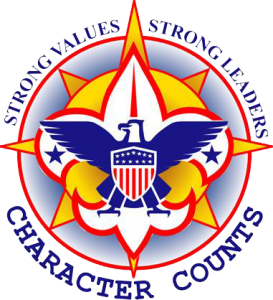Why should a boy or girl join scouting, whether Cub Scouts, or Scouts BSA? Why should a young man or young woman join Venturing, Sea Scouts or Exploring?
The short answer: Because being a Scout MAKES A DIFFERENCE.
Tufts Study
Current and former Scouts have always felt that Scouting has made a difference in their lives. A study by Tufts University has found that Scouting does in fact have a measurable, positive impact in the character development of young people. The study, funded by the John Templeton Foundation, involved nearly 1,800 Cub Scouts and 400 non-Scouts under the age of 12, and was conducted over three years (2012-2015). It sought to measure the difference Scouting makes in young people’s lives as those positive changes were happening.
Participants were assessed at five intervals during the study to see if and how character changes were taking place. At the beginning of the study, there was no statistically significant difference in character between those in Scouting and those who weren’t—ruling out the possibility that Scouting simply attracts people of higher character to begin with. “After three years, Scouts reported significant increases in cheerfulness, helpfulness, kindness, obedience, trustworthiness, and hopeful future expectation,” said Dr. Richard M. Lerner, who led the study at Tufts University. “In our control group of non-Scouts, there were no significant increases, and in some cases (e.g., religious reverence) there was an observed decrease, which was quite striking.”
In addition, the study found a direct correlation between the amount of time boys spent in Scouting and the positive impact realized—those who spent more years in the program reported higher character attributes. Scouts who were more engaged also reported higher character attributes. And those who attended regular meetings reported higher character attributes compared to those with lower attendance.
View and download the one page study infographic
Learn more about the study
Download the Foundational Paper
Study highlights and presentations
Baylor University Study
Over 100 years after Arthur Eldred of New York earned this nation’s first Eagle Scout Award, new, independent research demonstrates the significant, positive impact Eagle Scouts have on society every day. Since it was first awarded in 1912, more than 2 million young men have achieved the Boy Scouts of America’s highest rank. The study conducted by Baylor University in 2010, Merit Beyond the Badges, found that Eagle Scouts are more likely than men who have never been in Scouting to:
- Have higher levels of planning and preparation skills, be goal-oriented, and network with others
- Be in a leadership position at their place of employment or local community
- Report having closer relationships with family and friends
- Volunteer for religious and nonreligious organizations
- Donate money to charitable groups
- Work with others to improve their neighborhoods
Summary results & download brochures
Download the complete study
More information about the study here
Values of Americans Study
In a 2005 study, Values of Americans―A Study of Ethics and Character, Scouting was found to have material impacts on its former youth members. For example, compared to men who were never Scouts:
- Men who were Scouts were more likely to have higher levels of education
- Men who were Scouts were more likely to have higher earnings
- Men who were Scouts were more likely to own their own homes
- Generally, the longer men were scouts, the greater the differences
Eagle Scouts
Attainment of the rank of Eagle Scout is a great achievement by any Scout. Over 55,000 youth earned the rank in 2015, approximately 6.4% of eligible youth.
Of the 312 pilots and scientists selected as astronauts, over two-thirds were Scouts. And 12.5% of all astronauts were Eagle Scouts. Of the 24 men who traveled to the moon, 21 were Scouts. Over 80% of the 12 men who physically walked on the surface of the moon were Scouts. The first man to walk on the moon (Neil Armstrong) was an Eagle Scout.
In 2014, the graduating classes of the various military service academies included 413 Eagle Scouts. That is over 12% of all graduates. And these numbers do not include young women who earned the Girl Scout Gold Award.
What’s the takeaway? While we can’t say being an Eagle Scout will guarantee a career with NASA or an appointment to West Point, Annapolis, or the Air Force Academy, we do know that Scouting’s focus on STEM and its instillment of leadership skills prepared these astronauts, cadets, and midshipmen for a series of challenges and opportunities to excel. Just think what the program can do for your son or daughter.

